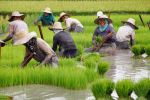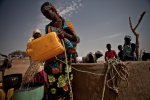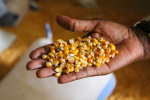News
29.05.2015
UN hunger report: 795 million still chronically undernourished

About 795 million people in the world, or one in nine, suffer from hunger, according to new estimates published on Wednesday by the Food and Agriculture Organisation (FAO), the International Fund for Agricultural Development (IFAD) and the World Food Programme (WFP). The vast majority of the world’s hungry - 780 million – live in developing countries. Numbers only declined by 10 million in comparison with last year’s report. While some regions have made significant progress in the fight against hunger, others continue to lag behind. Latin America has been able to reduce the prevalence of undernourishment to 5.5% of the population. In sub-Saharan Africa, however, one in four people remain chronically undernourished and the numbers have even increased to 220 million over the past years. Two thirds of the world’s hungry, 512 million people, live in Asia. Although 55 countries will not achieve the Millennium Development target of halving the proportion of the chronically undernourished, FAO Director General José Graziano da Silva remains optimistic: “The near-achievement of the MDG hunger targets shows us that we can indeed eliminate the scourge of hunger in our lifetime.” According to the FAO, inclusive economic growth, agricultural investments and social protection, along with political stability and political will are preconditions for the elimination of hunger. But in recent years, progress towards fully achieving the 2015 food security targets was hampered by extreme weather events, natural disasters, political instability and civil strife. The report estimates that around 19% of the world’s undernourished live in countries enduring protracted crises. In order to meet the MDG hunger target, the prevalance of undernourishment in developing countries would have needed to halve compared to 1990 levels. The proportion declined to 12.9% of the population, down from 23.3% a quarter of a century ago, also due to the fact that the world population has increased since then by 1.9 billion. The more ambitious World Food Summit target of halving the absolute number of undernourished people to 500 million remains out of reach. Today, there are only 216 million fewer people who are suffering from hunger than in 1990-92. In addition, much of the progess made in fighting hunger can be attributed to China where the number of undernourished people fell by 155 million in this period. “If we truly wish to create a world free from poverty and hunger, then we must make it a priority to invest in the rural areas of developing countries where most of the world’s poorest and hungriest people live,” said IFAD President Kanayo F. Nwanze. (ab)
27.05.2015
France to ban supermarkets from throwing away unsold food

Supermarkets in France will be forced to give away unsold food to charities in an effort to tackle food waste. On Thursday, the French national assembly voted unanimously to pass the legislation which forms part of a larger environmental bill. Under the new law, supermarkets measuring 400 square metres or more would be forced to give any unsold, but still edible, goods to charities or to farms for use as animal feed or compost. This includes products which would be thrown away because they are damaged or because their best-before dates are approaching but are not dangerous to eat. Big supermarkets will have to sign contracts with charities by July next year or face penalties including fines of up to €75,000. The bill was proposed by Guillaume Garot, a Socialist deputy and former food minister. “It’s scandalous to see bleach being poured into supermarket dustbins along with edible foods,” he told The Guardian. The legislation also includes education programmes about food waste in school cafeterias and businesses. The overall bill will need to go to the senate for final approval. Environmental groups welcomed the vote, but warned that it could also send out all the wrong signals while failing to address the wider issue of overproduction and wastage in food distribution chains. The French measures are part of an effort to halve the amount of food waste in the country by 2025. The Ministry of Ecology, Sustainable Development and Energy estimates food waste to amount to 7.1 million tonnes. According to official estimates, wasted food costs the average French household €400 a year, and the country up to €20 billion. Similar rules could also be put in place in the UK and other countries in Europe. A report earlier this year showed that in the UK, households threw away 7 million tonnes of food in 2012. An online petition started last week is urging the British government to adopt the French proposal. Posted on the 38 Degrees campaign website, the petition is calling for supermarkets to hand over all unsold food to charities and suggest the introduction of a voluntary payment to be added to all online orders to fund a delivery service to those in need. By Wednesday morning, the petition had been signed by more than 123,000 people. (ab)
22.05.2015
Organic farming benefits biodiversity, study finds

New research suggests that organic farming increases the biodiversity in agricultural landscapes. A study published in the journal Proceedings of the Royal Society of London B- Biological Sciences shows that organic fields have a higher diversity of wild plants, offsetting the loss of biodiversity on surrounding conventional farms. The researchers at Swansea University compared organic and conventionally farmed fields sowed with winter wheat in the Poitou-Charente region of France. They found that the presence of organic farming in the landscape led to higher local weed biodiversity also for conventionally farmed fields, and even reached a similar biodiversity level to organic fields in field margins. While weeds may induce crop yield loss, they represent the basic trophic component in agricultural food webs. “Wild plants are important for birds, bees and other farmland species. Organic farming has advantages in maintaining these,” said Dr Luca Borger of the Department of Biosciences at Swansea University. However, the intensification of agriculture has led to a loss of biodiversity in agricultural landscapes. Wild plants are strongly affected by the application of herbicides and fertilisation. As organically farmed fields in general harbour more insect-pollinated plants, forbs and rare or threatened weeds, their presence in the landscape could mitigate the negative effects of conventional agricultural management. „Even a mixture of organic and non-organic farming in an area can help maintain this biodiversity. Even only 25% of fields being organically farmed can make a difference”, said Dr Luca Borger. Land-sharing between organic and non-organic farms could have benefits for both crop production and biodiversity. According to the researchers, very few studies have investigated how the biodiversity of a field is affected by the presence or density of organically farmed fields around them. They said further studies are needed but they hope their research will contribute to the debate on the environmental benefits of organic farming over conventional methods. (ab)
19.05.2015
New report links universal access to water with food security and nutrition

Water is key to food security and nutrition. However there are many challenges in the wider context of the nexus between water, land, soils, energy and food, given the objectives of inclusive growth and sustainable development. This is the main message of a new report, launched on Friday by the High Level Panel of Experts (HLPE) for the UN Committee on World Food Security (CFS). The report explores the relations between water and food security and nutrition, from household level to global level, and calls for coherence on these issues at all levels of policymaking and water management. In an article for The Guardian, Professor Lyla Mehta, the team leader of the report, writes that, “Policies and governance issues on land, water and food are usually developed in isolation. Against a backdrop of future uncertainties, including climate change, changing diets and water-demand patterns, there has to be a joined-up approach to addressing these challenges.” She argues that since there are competing demands over water from different sectors such as agriculture, energy and industry, policymakers need to prioritise the rights and interests of the most marginalised and vulnerable groups, with a particular focus on women, when it comes to water access. The authors describe the growing influence of corporate actors, which compete with agricultural smallholders, fishers and poor households for access to water. Lyla Mehta notes that, “Smallholder farmers produce more than 70% of the world’s food but often lack recognition of their land and water rights in formal legal systems. Women and girls frequently spend several hours a day collecting water but lack decision-making power when it comes to water management.” States and other relevant stakeholders should therefore ensure that policy and legislation give women and men equal access to water and make sure to avoid negative effects on the the food security of the urban and rural poor in any reform in water management. In a foreword to the report, the Chair of the HLPE Steering Committee, Per Pinstrup-Andersen, concludes, “Safeguarding water for the dignity, health, food and nutrition security of everyone on the planet is one of the biggest challenges that humanity currently faces. It is a fundamental dimension of the sustainable development agenda. We hope that this report will help policy makers and actors around food, agriculture, water and all concerned sectors worldwide to overcome this challenge.” (ab)
15.05.2015
Monsanto-Syngenta merger could further consolidate seed monopoly

A proposed merger of agribusiness giants Monsanto and Syngenta could further advance the global concentration of the seed market, consolidating the power of a handful of companies over our food system, according to Canada-based civil society organisation ETC Group. If Monsanto succeeds in buying its Swiss rival Syngenta, the very basis of food production could be threatened by a new level of monopoly over seeds. In a report released on Friday, ETC Group warns that if Monsanto and Swiss seed giant Syngenta are allowed to merge, the new company will control 54% of seed sales and a third of the world’s pesticide market. The two companies are currently in negotiations. Last week, Syngenta’s board rejected a $45 billion takeover bid from Monsanto, saying the offer undervalued the Swiss seed giant and did not fully take into account regulatory risks. “This tiny group of companies is attempting to tighten its grip on the global food supply, and the new way of justifying that is pushing the need for climate smart agriculture,” said Pat Mooney, Executive Director of ETC Group. “For the private sector, ’climate-smart’ implies a patent rush on genetic traits for abiotic stress-tolerance (e.g., drought, heat or salt resistance). But this rush is recent. The big companies’ multi-decade focus on herbicide tolerance has meant that they have neglected or negated much more important stress-tolerant traits and have actually undermined plant resilience“, the report warns. Whatever the result of the current merger machinations, farmers and consumers will be the losers. The organisation believes that farmers who have bred and nurtured seeds for 12,000 years will be forced to pay patent royalties and sign contracts that prohibit them from saving their own seeds. “The agribehemoths claim that only the biggest can feed the world,” said Veronica Villa from ETC Group’s Mexico office. “They’ve been big for decades, and more than 800 million people are still hungry and many more are badly nourished.” (ab)
11.05.2015
Food supplies at risk as depletion of soil accelerates, scientists warn

Soil erosion, combined with the effects of climate change and the loss of agricultural land to urban sprawl, will threaten global food security unless drastic action is taken to preserve the fertility of the world’s farmland, warns a paper published on May 7th in the journal Science. Soil provides the basis for agriculture, improves water quality and stores carbon. However, human activities are depleting Earth’s soil resources. According to the authors, unsustainable farming practices have accelerated the loss of soil through erosion and nutrient removal. Agriculture is therefore a major game-changer for the long-term health of soil - the “living epidermis” of the planet. Lead author Ronald Amundson, a professor at the University of California, Berkeley, said that “Ever since humans developed agriculture, we’ve been transforming the planet and throwing the soil’s nutrient cycle out of balance.” People are often not aware of the geological transformation because the changes happen slowly, he explained. Soil erosion has increased since the “green revolution” with its intensive use of chemicals and fertilisers. Although these methods helped to significantly increase crop yields, the ability of soil to support the growth of our food supply is now reaching a peak. The authors note that most of the Earth’s fertile soils are already in agricultural production. In addition, urbanisation is eating up productive farmland. Between 1970 and 2000, an area of agricultural land the size of Denmark became urbanised. Over the next 20 years, 1.5 million square kilometres of land, an area the size of Mongolia, will be converted to urban areas, the scientists warn. The supply of nitrogen, potassium and phosphorous, the three main fertilisers, could also become a major political challenge and lead to uncertainties. The nitrogen synthesis process is energy-intensive, making its supply dependent on fossil fuels. Phosphorous and potassium come from rocks and minerals which are not equitably distributed throughout the world. The authors point out that the United States has only 1 to 2% of global potassium reserves and its phosphorous reserves are expected to run out in about three decades. “Morocco will soon be the largest source of phosphorus in the world, followed by China,” Dr Amundson said. „These two countries will have a great deal of say in the distribution of those resources. Some people suggest we will see the emergence of a phosphorus cartel.” The authors call for a better management of soils. One proposal is to recycle nutrients captured in waste treatment facilities in the same way that paper and plastics are recycled from domestic waste, Dr Amundson said. “The nutrients lost can be captured, recycled and put back into the ground. Additionally, more efficient management is needed to reduce losses from soil. Excess nitrogen, for example, is considered a pollutant, with the runoff sapping oxygen from the nation’s waterways, suffocating aquatic life and creating dead zones in coastal margins. (ab)
08.05.2015
WHO warns of looming obesity crisis in Europe

Europe will face an obesity crisis of enormous proportions by 2030 unless immediate action is taken, according to latest projections released by the World Health Organisation (WHO) on Wednesday. At a congress in Prague, the WHO’s Regional Office for Europe presented the results of an obesity forecast which was undertaken with the UK Health Forum. The experts looked at data from all European countries and compared 2010 figures with projected levels for 2030. Being “overweight” is defined as having a Body Mass Index (BMI) between 25 and 30 and “obese” by a BMI of 30 and above.They present a worrying picture of rising obesity across Europe. Ireland leads the trend - 91% of men and 85% of women in the country are expected to be overweight by 2030. The overweight category also includes obese people. Almost 57% of Irish women are likely to be obese in 2030, compared with 23% in 2010. In the UK, 73% of men and 63% of women are forecast to be obese in 2030. One third (33%) of women will be obese in 2030, compared with over one quarter (26%) in 2010, while obesity figures for men will rise from 26% to 36% over the same period. Dr Laura Webber, of the UK Health Forum, warned there was “a worrying picture of rising obesity across Europe“. She said: “ Policies to reverse this trend are urgently needed. Although there is no ‘silver bullet’ for tackling the epidemic, governments must do more to restrict unhealthy food marketing and make healthy food more affordable.“ Other countries facing growing obesity problems include Greece, Spain, Austria and the Czech Republic. An estimated 77% of Greek men is forecast to be overweight by 2030 compared to 66% in 2010, while the proportion of obese Greek men will more than double from 20% to 44% over the same period. Obesity levels for Greek women are predicted to jump from 20% in 2010 to 40% in 2030. Even Sweden, where there has traditionally been a low prevalence of obesity, will see significant rises. Only the Netherlands seems to be doing slightly better than their neighbours. Only half of Dutch men will be overweight and just 8% obese by 2030. For Dutch women, the proportion of overweight will remain stable and the obesity rate is predicted to fall from 13% to 9% during this period. (ab)
04.05.2015
Climate change threatens one in six species, new study

New studies suggest one in six animal and plant species on the planet could face extinction if nothing is done to mitigate climate change. A study published Thursday, in the journal “Science” found that, extinction risks will accelerate with rising temperatures. Dr Mark Urban, an ecologist at the University of Connecticut, performed a meta-analysis of 131 published scientific studies on the risk of extinction from climate change. He found that extinction risks were highest in South America, Australia and New Zealand. These regions harbour many species that have adapted to live in habitats not found elsewhere. North America and Europe were characterised by the lowest risks. The majority of studies Dr Urban analysed were from Europe and North America, whereas only four studies focused on Asia. This means that poorly studied regions might face even higher risks but more research is needed for better insights. Endemic species with smaller ranges are predicted to face greater extinction risks, while risks do not vary significantly by taxonomic group. “Many species will be able to shift their ranges and keep up with climate change whereas others will not, either because their habitat has disappeared or because they can’t reach their habitat anymore,” Dr Urban explained. He evaluated how extinction risk varied depending on future global temperature increases, taxonomic groups, geographic regions, as well as on the different models and assumptions. Current predictions about extinction risks range from 0 to 54%. Overall, Urban found that 7.9% of species were predicted to become extinct from climate change. However, the rate of biodiversity loss is likely to accelerate with rising global temperatures. If future temperatures rise by 2 degrees compared with pre-industrial times, which most experts believe is no longer achievable, global extinction risk will rise from 2.8% at present to 5.2% in the future. With an increase of 3°C, 8.5% of species would become extinct. But under the scenario where global warming continues on its current path and temperatures rise by 4 degrees, 16% of species face extinction. “If the world does not come together and control greenhouse gas emissions and we allow the Earth to warm considerably we will face a potential loss of one in six species,” said Dr Urban. Commenting on the research, Prof John J Wiens of the University of Arizona, said the global extinction risk might be even higher than 16%, as the majority of studies analysed were from Europe and North America, where extinction risks are lower. (ab)
28.04.2015
France gives doggy bag a chance in an effort to tackle food waste

France is to adopt new measures with the goal of cutting food waste in half by 2025. In a report presented to the French government on April 14th 2015, Socialist MP Guillaume Garot put forward 36 proposals to prevent the mass disposal of food. His suggestions could soon be transposed into national law. The ideas include promoting ‘doggy bags’, which would allow restaurant-goers to bring their leftover meal home with them. According to the report, wasted food costs the average French household €400 a year, and the country up to €20 billion. The Ministry of Ecology, Sustainable Development and Energy estimates food waste to amount to 7.1 million tonnes. Mr Garot suggests prohibitions for supermarkets and retailers to throw away edible food, making it compulsory for supermarkets to donate unsold food to charitable associations. In addition, special “against waste” sections in supermarkets are to offer products which are nearing their expiration dates at a discounted rate. Another proposal is to replace the term “best before” and inform consumers about the various definitions of “expiry dates" in order to avoid misunderstandings. The report also includes the suggestion that restaurant owners should encourage customers to take leftovers home in so-called ‘doggy bags’ - until recently an unthinkable practice in French restaurants. Mr Garot admits that, “most customers don’t dare ask for the remains of their meal, and restaurateurs can see it as ‘degrading’ their dishes”. However, wastage has reached such levels that French diners need to overcome this “cultural obstacle” to prevent edible food from ending up in the bin, Garot adds. In an effort to make the doggy bags more palatable, hotel and restaurant industry union UMIH have signed a deal with one provider to “generalise the practice of the doggy bag in France”, calling them “le gourmet bag” instead. (ab)
23.04.2015
U.S. award stirs up controversy over genetically modified Golden Rice

Environmentalists and farmers’ organisations have heavily criticised the White House’s decision to award a humanitarian prize to the scientists who invented vitamin-enriched “Golden Rice”, describing it as a “hoax”. The United States Patent and Trademark Office (USPTO) announced Professor Ingo Potrykus of the Swiss Federal Institute of Technology in Zurich and Peter Beyer of the University of Freiburg in Germany as the winners of the “Patents for Humanity Award“. The scientists invented the genetically modified rice after a decade of research and granted Swiss agro-chemicals company Syngenta the rights to develop the technology. Golden Rice has been genetically modified to provide beta-carotene, a precursor of Vitamin A, one of the essential micro-nutrients. Vitamin A deficiency causes between 2 and 3 million deaths each year, as well as approximately 500,000 cases of blindness among children. The GM rice is being developed by the International Rice Research Institute (IRRI) in the Philippines. Preliminary results were mixed. In 2014, IRRI announced that more research would be needed before Golden Rice can be commercialised due to its very low yield performance compared to local varieties used by farmers. Biodiversity experts Vandana Shiva, laureate of the Right Livelihood Award, described the White House ‘award’ to Golden Rice as a desperate attempt to promote failed GMOs. Shiva commented: “Golden Rice is the Emperor who has no clothes. Since 1985 the promoters have been promising the miracle, but it is still far from introduction. In any case it is hundreds of percent less efficient than biodiversity alternatives in providing Vitamin A. Because the malnutrition crisis is so severe, we cannot waste time and resources on false promises.” Filipino farmer-scientist group MASIPAG believe that GM rice will not solve malnutrition: “Poverty and hunger are the main culprits in malnutrition cases. Therefore to address Vitamin A Deficiency, we should address the lack of resources to ensure that people have access to proper nutrition,” said Dr Chito Medina, National Coordinator at MASIPAG. The organisation has been pushing for agroecology and sustainable agriculture to improve food security in Asia. According to Medina, “Global and international studies such as the International Assessment of Agricultural Knowledge Science and Technology for Development (IAASTD) and the UN Special Rapporteur on the Right to Food have recognized agroecology and other farmer innovations as a means to address food security and rural development. Contextually appropriate technologies will better serve the farmers and consumers of developing countries, rather than a potentially harmful technology such as Golden Rice.” (ab)
- Scientists behind 'golden rice' GM crop to receive humanitarian award from the White House
- Right Livelihood Award: Laureates react to Award to Golden Rice researchers by the White House
- IRRI: What is the status of the Golden Rice project coordinated by IRRI?
- Masipag.org: Farmer-scientist group deplore secretive visit of Bill Gates to IRRI
- Seed Freedom: Tell the White House: No Award to Syngenta for Golden Rice Hoax

